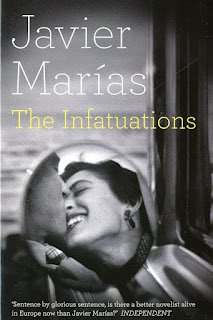Infatuations
It is a painfully smug habit to begin a review by referring to other books you have read by the same author. In my case these are All Souls (1989); A Heart so White (1992) and Dark Back of Time (1998). All Souls involves a Spanish academic and an affair, and is – according to Penguin Books – ‘a masterpiece of black humour’. A Heart so White involves an investigation into the past of the narrator’s father, with echoes of Macbeth. A Dark Back in Time is so strange that it is it attracts reviews with words like ‘extraordinary’ and ‘dazzling’ – a sure sign that no one can make head nor tail of what Javier Marías had in mind when he wrote a book with a character named Javier Marías recalling the sources of his earlier writing. The Infatuations, I am relieved to say keeps its digressions and literary allusions under tight discipline, paradoxically through sentences that can only be described as ‘extraordinary’ and ‘dazzling’. This novel is difficult to describe without giving away the plot, so stop here if you intend to read in the next little while.
Our narrator is Maria Dolz, a name not so different from the
author’s surname Marías, another game of the author’s I imagine, since he makes
quite a deal of Spanish uses of first and second names in the novel. Dolz is a
literary book editor used to the egotism of writers, with one particularly
painful writer rehearsing an acceptance speech in Swedish for when he wins the
Nobel Prize for Literature, an eventuality Dolz thinks rather unlikely. Dolz’s
first infatuation is with ‘the perfect couple’ whom she observes each day at a
café she visits before starting work. When the couple stop attending, and she
finds out about the murder of Miguel Deverne, a new infatuation begins in
imagining the life of Luisa Alday who has to live on without her attractive husband,
the victim of a seemingly random and violent murder by a homeless man. From
here, and by chance, Dolz begins a relationship with Deverne’s best friend and
Alday’s support, Javier Diaz-Varela. Javier, you see, is the other half of the
author’s name – so Javier and Maria are a couple in a novel written by Javier
Marías.
Diaz-Varela, like Maria Dolz (or because of her, it’s
impossible to know) is a gifted story teller who holds the floor with Maria in
a relationship which is as much about narrative as it is sex. It is a temporary
relationship, which like a story, will last only as long as the tale and not a
moment more. In talking about his life, Diaz-Varela describes scenes from
Duma’s The Three Musketeers and
Balzac’s novella Colonel Chabert,
while Maria – like Marías – is partial to allusions to Macbeth, with his (or her) Heart
so White.
This editor is so imaginative that one wonders whether she
isn’t in fact a writer in disguise (and in this sense, a partial explanation of
the play on names already outlined). She (and the author) move in and out of
character viewpoints, and allow sentences to last half a page or more at times,
to digress and build ideas and images in a literary style that is truly a
marvel to experience. As to what it all means – this story about infatuation
and murder – the following sentence from towards the end of the book might get
us somewhere (and characterise the thematic intent of the author more broadly
across his titles).
‘When someone tells us something, it always seems like a
fiction, because we don’t know the story at first hand and can’t be sure it
happened, however much we are assured that the story is a true one, not an
invention, but real. At any rate, it forms part of the hazy universe of
narratives, with their blind spots and contradictions and obscurities and
mistakes, all surrounded by shadows or darkness, however hard they strive to be
exhaustive and diaphanous, because they are incapable of achieving either of
those qualities’ (302).
Oh, what a tangled (diaphanous) web we weave when first we
practice to read an anti-detective novel by the masterful Javier Marías! Yes,
as Maria thinks to herself on the second last page as she walks away from an
imperfect couple – ‘there’s nothing wrong with acknowledging that … When we get
caught in the spider’s web …’




Comments
Post a Comment